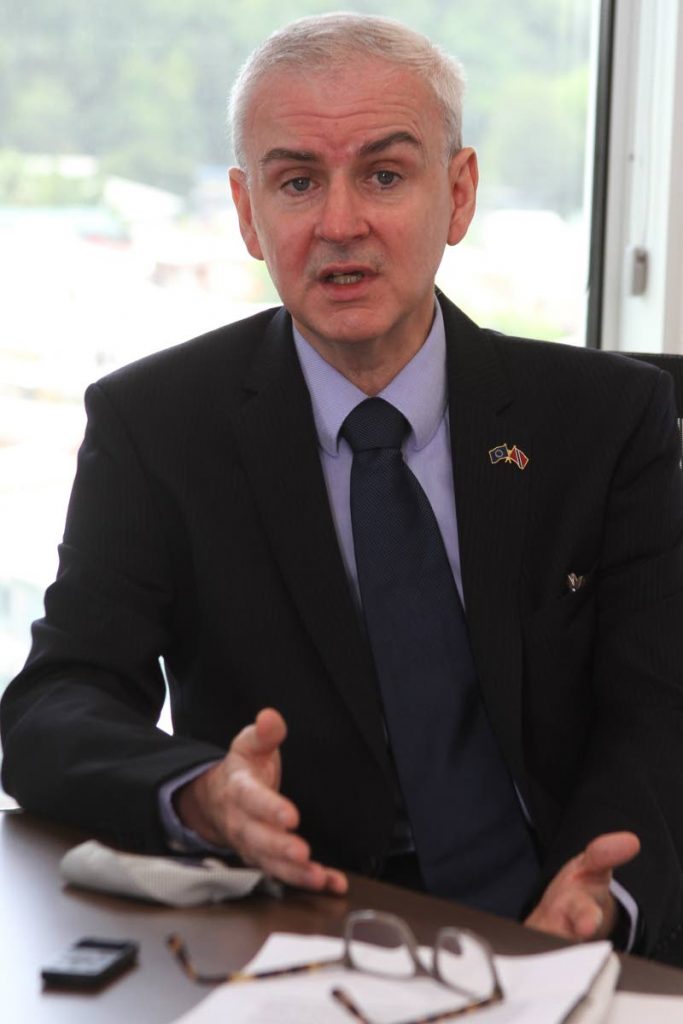COP26 has to be the turning point: From climate talks to solutions

Statement from the EU Ambassador to TT – HE Peter Cavendish
THE EVIDENCE is clear. In August, the world’s scientists concluded, once again, that immediate action is needed. Climate change is uncomfortably closer to all our daily realities no matter where in the world we live. It is triggering the kind of climate disasters we saw this summer, putting the survival of many species at risk and may soon render parts of the Earth uninhabitable to humans.
In Paris, five years ago, the international community finally agreed to embark upon an ambitious journey to limit global warming to between 1.5 and 2 degrees Celsius. While such levels of warming might seem manageable, the difference could be existential. For the human body the difference between 40 and 42° C is the difference between life and death. Containing the temperature increase means limiting climate disruption and reducing the chance of natural disasters.
The European Union has fought hard to keep the Paris Agreement alive. Negotiations are done and the time for climate action is here. Each state must increase its ambition to cut global emissions. Unfortunately, the UNFCCC (United Nations Framework Convention on Climate Change) just released a disheartening report: under current commitments, global temperature would rise by an unacceptable 2.7° C by 2100 – a gloomy outlook to say the least.
Yet the news is not all grim. Science tells us that a zero-carbon society is possible – a society of new green jobs and growth that can limit warming to 1.5° C. The European Union has already shown that it is feasible to decouple growth from CO2 emissions (since 1990, our GDP has grown by over 60 per cent while net greenhouse gas emissions have fallen by a quarter). In July, we released our legislative package to implement the European Green Deal and deliver a 55 per cent net reduction in greenhouse gas emissions by 2030, on the path to climate neutrality by 2050.
This transition of how we generate and use energy, move around, build and heat houses and use the land is designed in the fairest possible way to ensure that no one is left behind. It will not work otherwise.
Yet the EU cannot manage alone, as we are accountable for only eight per cent of global CO2 emissions. We need to inspire others – even the most reluctant partners – to join the path to climate neutrality.
We invite all partners to strengthen their climate mitigation and adaptation plans. We are ready to offer technical and financial support and to “walk the talk” with our own Climate Law and Adaptation Strategy. We are among the world’s biggest providers of climate finance, releasing EUR 22 billion (US$26 billion) in 2019, representing more than a third of the total effort by developed countries.
Moreover, we are committed to scaling up this amount further in the years to come, as can be seen by European Commission president Von der Leyen’s recent announcement of an overall EUR 4 billion top-up under the EU’s core budget over the 2021-2027 period.
We now need a systemic and exponential change away from fossil fuels. Such change is good for our health, our households, our crops, our water, our jobs and our economies. However, it will require the support of world leaders and action from citizens. Every action counts: how we vote, what we eat, how we travel. Just how damaging climate change will be is in our hands.
The EU strives to take a leading role in climate action, but we want to do more. In Trinidad and Tobago, for example, we are supporting the Government’s climate mitigation strategies via the EU-funded Global Climate Change Alliance (GCCA+). This EUR 4 million (approximately TT$32 million) in support is intended to bolster the country’s climate resilience by introducing renewable energy as a clean source for electricity generation.
One project will see the installation of a solar park at the Parc International Airport. The other will support the implementation of TT’s national determined contribution (Paris Agreement commitments) to reduce carbon emissions by 15 per cent through 2030.
We invite our partner countries to challenge us, please feel free, and we encourage you go even further with your mitigation efforts. Climate action can take place anywhere, at any level. There is no time left for inaction – the time for practical solutions is now. From the most basic to the most innovative, every action counts.


Comments
"COP26 has to be the turning point: From climate talks to solutions"